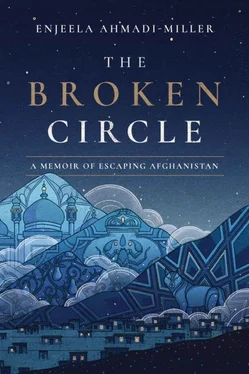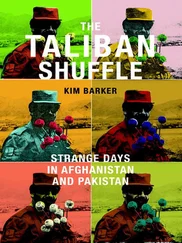On the table was a brown manila envelope. I went to snatch it up, but Padar beat me to it. He opened it and took out five tickets. One for each of us. I took one out of his hands. It was a round-trip train ticket, originating in New Delhi. Laila took one and scrutinized it.
“The ticket from New Delhi to Raxaul, India, was for three days ago,” she said. Raxaul was just over the Nepal border.
“That’s correct.” He pointed at her, his cigarette curling smoke from between his fingers.
“The return tickets are for tomorrow,” Padar said.
Ram smiled and took a deep drag. “What’s for dinner? We better eat hearty because tomorrow we have a long bus ride to the border.”
Zia gave a shout of joy. Laila cheered. Zulaikha smiled and laughed. Padar came over and shook Ram’s hand. “Thank you, brother.”
Ram’s smile twinkled as he took another drag. I couldn’t wait to cross over into India. We were family. God had circled this city on the map of my life. The trees got along; they gave way to each other. That’s what love looked like. I saw it for myself in the Garden of Dreams.
It was midmorning when we rolled into the border city of Birgunj. From the window of our bus, the Shankaracharya Gate, leading into India, loomed large in front of us as we passed the Birgunj Customs Office, just a half mile from the border. The gate itself, with three-tiered pagodas extending from the top of each pillar, and from the center of the arch, another massive two-tiered pagoda, filled me with awe. Gold-leafed Hindu deities adorned the face of each pillar and the crown of the arch; the deities stared down at us. It was an impressive sight. A welcome sight. A beautiful entrance to the road to New Delhi.
The bus pulled into a dirt lot adjacent to the border. Padar and Ram had rehearsed with us what we were to do—act like tourists who were lined up at the border checkpoint. Our bus was filled with Indian nationals who had been vacationing and shopping in Kathmandu. With our validated round-trip train ticket to New Delhi, we would mingle with the many Indian citizens returning home after a vacation in the stunning mountains of Nepal.
Off the bus, I followed Ram, who surged to the middle of the pack of tourists as we strode toward the border checkpoint. A line of trucks, crossing into Nepal, trundled through the great arch of the Shankaracharya Gate. We headed in the opposite direction, past the arch, toward the border checkpoint. I couldn’t help but remember the last time we had approached the Indian border, when Padar and Ram had been beaten by the soldiers. Everything inside me tightened into a knot. A line of tourists formed in front of us as our group advanced toward the guard station. We inched ahead, Laila and Zia right behind me, a step at a time. I peered around Ram, down the line ahead. A soldier leaned out a doorway, taking tickets from the hand of each person as they passed through to India. He would say something to them, return the ticket, and the line would move forward. My heart began to pound. The soldier would see in my face that I wasn’t from India and he would stop me, ask me a question in Hindi, which I would know only if I were from New Delhi.
The line crept forward, closer to the guard post. Zia was jabbering about something behind me, but I blocked it all out, focusing on the shuffling of my feet across the hard-packed dirt. It seemed my whole past became one blurry clot of time—all I had thought about for the past four years was getting to India to Mommy. If this scheme that Ram and Padar had cooked up to fool the guards didn’t work, I was certain Padar, if he didn’t get beaten or jailed, would come up with another plan, one more daring, more audacious, more brazen, because these men in uniform with guns could not defeat our will to be a family again. I fortified myself with these thoughts as I approached the hand that stretched through the doorway, checking tickets.
With every inch forward, I realized that not one person had been turned down. The passage had been peaceful, and there were no nervous families waiting to the side for an uncertain fate. Everyone was being let through. No fighting, no arguing, no threats of going to prison. Still I began to jitter inside, thinking of all the possible things that could go wrong. Ram had told me to give the soldier a big smile, act like I was glad to be going home. To simply nod my head if they asked something. I couldn’t help thinking of Padar’s bloody nose just a few weeks ago. Finally, Ram gave his ticket over. He hesitated a moment as the guard reached for it, scrutinized it, then waved him through.
One short stride ahead, and I raised my ticket to the man’s outstretched hand. If I smiled, I don’t remember consciously doing so. But I must have smiled, because the dark-eyed man simply touched my train pass with his finger, grinned back, and waved at me. I saw his lips move, but I didn’t hear his words. I could hear nothing but a rushing sound. I swear I thought I heard the earth creaking on its axis. Zia shoved me from behind, and Ram took my hand and pulled me into India.
“Do you know what he said to you?” he asked me in his cheery way as we strolled away from the border.
I shook my head, too stunned to speak.
“He said, ‘Welcome home.’”

The swift clacking of the wheels along the steel rails had a hypnotic rhythm that soothed me into a dreamy daze, but I refused to nod off. The lush Indian countryside zoomed by, field by field, village after village. Our roomy private sleeping car on the Raxaul train to New Delhi was luxurious, with soft, cushioned seats, a door that slid closed for privacy, racks above us for what little luggage we carried, and a porter who came around with regularity, selling everything from cigarettes to fresh oranges, pastries, and sandwiches. Padar loaded us up with snacks and fruit, which we devoured while he smoked and laughed. We all laughed, our mouths full, juices from the oranges dripping from our lips. There were no more obstacles in our path to New Delhi, and now we were clipping along toward Mommy. With every puff of his cigarette, Padar’s shoulders grew rounder, his smile softer; the gleam in his eyes radiated relief as if a great battle had been won, and the troops who had lived on foreign soil for too long, battling implacable enemies, were finally on the road home.
It was just the five of us now. Ram had seen us to the train station in the town of Raxaul, which was a short bus ride from the border. We all said our goodbyes to him on the platform as we waited for our train to pull in. He was one of the warmest, kindest men I had ever met. He hugged each of us and wished us well and watched us as we boarded, giving us a big wave and smile as the window of our cabin rolled away from the station. I had known him for less than three weeks, but it had seemed much longer, a lifetime of friendship packed into my young memories.
As our car gently swayed west toward the capital, things pent up for so long in each of us unwound in a flight of craziness that we had been reluctant to indulge in since our days in Kabul.
“Did you know,” I said to Padar, “that Laila made us drink milk for weeks at a time when we were in that hotel in Peshawar?”
“Weeks?” he said, leaning back jauntily in the corner of the seat. He pulled out his pipe and tapped a pinch of tobacco into the bowl, then lit it.
“She wouldn’t give us any money to buy anything, not even a soda,” Zia said.
“Hmm,” he said, his pipe clacking in his mouth as he chewed on it and puffed. Clouds of sweet-smelling smoke filled the compartment as we went on and on about each other. Laila complained that I had not stopped jabbering the entire journey. That it didn’t matter what time of night or day, if I was awake, I was talking. That I never listened to her and was always wandering off, like the time I ran into the forest by myself and they all were frantically looking for me, and Zulaikha had nearly been in a panic that I had gotten lost or kidnapped or even worse, killed by soldiers or wild animals.
Читать дальше













